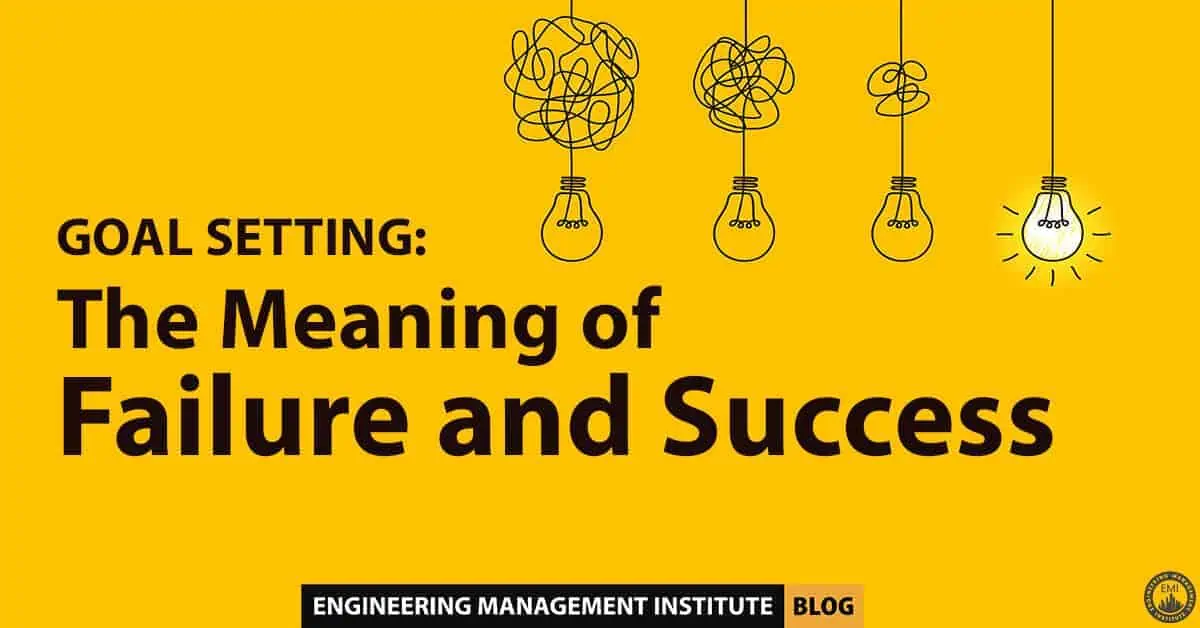This is a guest blog by Gina Covarrubias

What Is Failure and Success?
“I’ll be successful once I earn my P.E.” Does that sound familiar? How about, “If I don’t get the job I really want, it means I’m a failure.”
It can be tempting to define circumstances or results as a failures or successes, but maybe there’s another angle, a kinder, gentler way of viewing failure and success.
Let’s assess through an alternate set of lenses: failure and success are purely mental constructs applied by you, to you. That means you oversee the definitions of failure and success in the context of your own life. You are the sole owner.
As much as others might try to project their versions of failure and success for your life, you are the ultimate judge.
For example, if you spend months performing research to write and submit a grant, is it a failure if you are denied? Are there some ways in which you can find this scenario to be a success?
The wonderful thing about failure and success is that they are defined according to you and you only!
Giving Credit Where Credit Is (Not) Due
Let’s take this concept one step further.
The moment you tell yourself, “Hey, I was a great success doing XYZ!” you will probably feel elated or confident. In contrast, when you believe that you have failed, you may feel disappointment, inadequacy, or similar.
Either way, you are giving credit where credit is not due — which is to the failure or success itself. In doing so, you compromise your self-worth. If successful, you attribute success to feeling “good.” If things fail per your definition, you attribute the failure to feeling “bad.”
Instead, I am going to offer a refreshing perspective. What if you can be content and self-confident whether you’re embracing failure OR success? In other words, you can develop the skill of rewarding yourself for pursuit and effort rather than for the results they produce!
You might quip, “But how am I supposed to remain respectable and self-confident when I fail?” Or you might think, “Success makes me happy, failure makes me unhappy. That seems logical.”
A practical, more profound purpose of goal setting is introduced below and has nothing to do with failure or success!
The Purpose of Goal Setting
Planning deliberate steps to achieve your goals is a process that requires your prefrontal cortex, the human part of your brain. Animals do not have the ability to plan and make sacrifices today for long-term gratifications like we do.
Taking this concept to the next level, striving for goals can force us to manage a state of discomfort. That discomfort comes from the obstacles and challenges of doing something new and different. But sometimes we give up when it’s “too hard” or when it takes “too much time/effort.
It is those obstacles and challenges wherein we learn how to increase our human capacities and evolve into the next version of ourselves.
You see, if life were easy and everything went according to plan, we would learn to get very comfortable. Hence, there would be little incentive to pursue the hard things.
Therefore, we need obstacles and challenges to continue growing and preparing ourselves for the next phase in life. Goals force us to defeat the difficulties that prevent us from knowing how capable we truly are.
Goal setting enables you to enhance and build your brain capabilities so that once you evolve yourself to the next level, you get to do it all over again — regardless of failure/success!
Failure or success is insignificant when striving for your goal; rather, it is about who you have become along the way.
About the Author Gina Covarrubias

Gina is the founder of Deliberate Doing, an exclusive STEM coaching service dedicated to helping engineers fix their careers. She solves the common STEM problem: “What should I be doing with my life?” As a former engineer, she identifies with the technical expert who doubts their personal or professional existence.
Gina’s distinctive background blends life coaching expertise with 12+ years engineering/technology experience in the government, academic and corporate environments, all within the aerospace sector.
We would love to hear any questions you might have or stories you might share how you define failure and success when evaluating your goals.
Please leave your comments, feedback or questions in the section below.
To your success,
Anthony Fasano, PE, LEED AP
Engineering Management Institute
Author of Engineer Your Own Success





